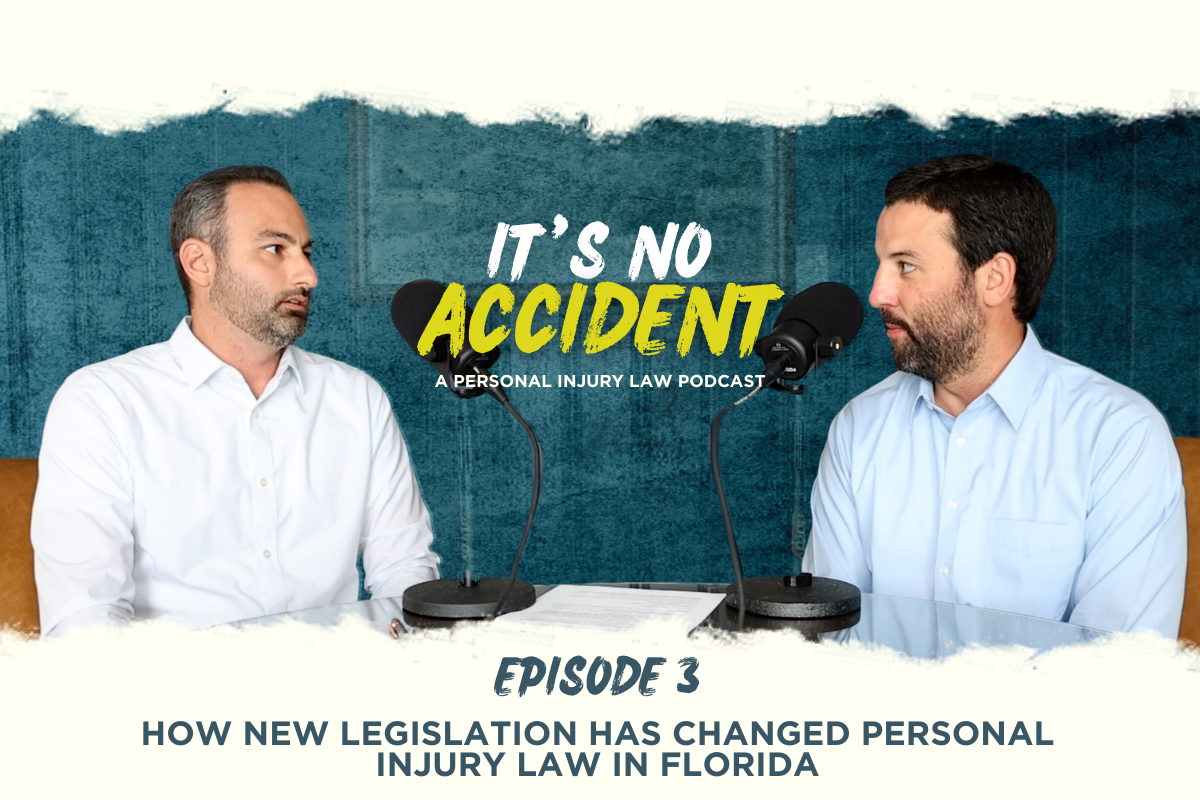
Personal injury law is changing in Florida. In 2023, the state legislature altered many of the laws governing how injured parties can recover from car crashes, slip and falls, and other incidents of negligence.
In this episode, attorneys Mark Nonni and Jaeson Homola discuss those changes and what they mean for you and others who have been or might be injured from the negligence of others.
Episode Transcript
Nonni: Welcome to It's No Accident, a podcast about the challenges of personal injury and wrongful death law in Florida, one of the nation's most complex legal environments. Homola: You'll hear compelling stories about real cases from our law firm in Tallahassee that will help you better understand your rights and protect yourself from the negligence of others. Nonni: I'm Mark Nonni. Homola: And I'm Jason Homola. Together: And this is it's no accident. Nonni: Let's probably talk about the state of personal injury law in Florida today. We get a lot of calls all the time with people that want to know what's going on with Florida law. So, what have you been telling people lately about that? Homola: Well, it's a very relevant topic right now. And it's actually a great place to start the podcast because my answer to this question would have been different, probably six months ago. As you know, and as all personal injury attorneys in Florida know, about three months ago, the Florida legislature changed pretty much everything about what we do. They changed the rules. It's like playing a basketball game, and the referee says, all right, for the second half, we're going to have different rules than we have for the first half. So we're kind of scrambling to figure out how this is going to work out, how judges are going to determine how this law is going to be interpreted, and really just rework what we do on a day-to-day basis. Because, I mean, if you ask any personal injury attorney, I think they're going to tell you that the Tort Reform that we had in Florida three months ago is probably the most comprehensive change that we've had in personal injury law ever. Mark, do you want to kind of talk about some of the things that changed? Yeah. Nonni: I know one of the things that people are asking me a lot and is kind of a really big deal is just the statute of limitations. You know, the deadline you have if you get injured, you have a deadline to basically file a lawsuit or reach a settlement with the other side. For years or decades, really, it was four years. You had four years to file a lawsuit or settle the case. And now it is, you know, based on these new laws that just got passed cut down to two years. And so I know that's something that a lot of people have asked me about and have been concerned about because it's a big change. You know, you get two less years to resolve your case in a fair manner. Homola: Right. And where that comes up in our cases really is, you know, a lot of times we'll have clients that get into an auto wreck, or they have a slip and fall, and they have these injuries that just kind of linger. You know, they'll start with their treatment, with their primary care doctor. And their primary care doctor will send them to physical therapy. And, you know, that might take six months for them to go through that treatment. And then maybe the physical therapy doesn't work. And then their doctor says, All right, we want you to go for another two months of physical therapy. So they do that, and then we're at eight months for nine months. And before you know it, you're coming up on a year where this person is still getting the medical treatment, and you haven't even gotten to the point where you're negotiating with the insurance company. And the doctors are then going to say, all right, well, physical therapy didn't work. How about we try pain management? So they go to pain management, they do that for, you know, 6 to 9 months. At that point, you're almost at two years. You have to talk to the insurance company about potentially settling the case. And the way that the law used to be, you know, we used to be able to let our client get the treatment that they needed and get maximal medical improvement sometimes that took over two years. Sometimes it doesn't. But I would say probably in probably a majority of our cases, it takes a while for our clients to get to the point where they feel like they're as good as they're going to get, or they're at the point where they were before the collision happened or the damage happened. So, with the legislature changing the rules, we're going to have to just file lawsuits on cases that we probably could have gotten settled within four years. But with the statute of limitations being two years, we have to get that lawsuit filed within two years, or our client's case is gone. Right. The rules say that you know, you just don't have a case anymore if you don't file within the two-year mark. So it's going to be a change. And, you know, I foresee that there's going to be more lawsuits that are going to be filed because clients just haven't gotten all the medical treatment that they need, which is strange because the purpose of the legislation was to cut down on lawsuits. And I think we're probably going to see more. Nonni: Right. Yeah. Like you said, I mean, it's, you know, before we maybe could have settled without a lawsuit if we had the four years. But now, with the two-year limit on it, we're going to have to file more lawsuits. And I think one of the things you said is also really important, which is the reason why we wait until the clients get done with their treatment is because if you don't, it's impossible to figure out how much a case is worth or what's a fair settlement for a case until the client's done with their treatment. One of the main factors of these cases is the injuries the person has and the treatment they need for it. And you can't, there's no way to evaluate what's fair until the client's done with their treatment, you know, and so it's just like you said, it's going to increase the amount of lawsuits that have to get filed and, you know, the amount of lawsuits that are going through the court system, unfortunately. Homola: Right. Right. And, you know, that's just the tip of the iceberg, too; there were comprehensive changes made throughout the entirety of personal injury law. One of the other big ones that changed was compared negligence. It used to be in Florida that if you were, you were injured by somebody else, and you made a claim against them. Say it's such a slip-and-fall case because that's where it comes up, a lot it our cases. It used to be that if you tripped and fell on someone's property, you slipped and fell on someone's property. You made a claim against them, and you went all the way to a jury trial. And the jury said, well, you know, you were not really paying attention. The evidence shows you weren't paying attention, and you probably should've seen what was on the ground, and you were wearing these shoes that, you know, maybe you shouldn't have been wearing. And, you know, they didn't have any tread on the bottom of them. You had them for 20 years. And the jury might say, we think you're 75% at fault, but we think that the owner of the property is 25% at fault. Well, it used to be that if that were the case, you would still get 25% of your damages. The legislature changed the law, and The law now says that if the jury comes back and says, if you're more than 50% at fault, you get nothing. So, you know, it's really changed our analysis on what cases we're going to take. And, you know, it's going to cut down on the ability for people to get compensation for their injuries and situations where they could have gotten compensation in the past. Nonni: Right. No, absolutely. And it also really lets negligent property owners and businesses off the hook. I mean, for their portion of the fault that the jury determines, you know, if the jury determines that they were 25% are fault, even 49% at fault. They don't have to pay anything for their negligence; they get off free, basically. Homola: And it's funny that you bring up the jury. The jury doesn't know that. The judge does not instruct the jury that, 'Hey, jury, just so you know, if you find the plaintiff more than 50% at fault, they're not going to get anything.' So, the jury is kind of in the dark. And, you know, they go back, and they do their job, and they make their determinations. But, you know, I've got to believe that if the jury is sitting back there and they know that you're not going to get anything if they're more than 50% at fault, it might kind of change the way that they look at things. But that's just the way that it is. And, you know, we've got to we've got to roll punches, so to speak. Nonni: That's true. And it's funny, you know, there's the amount of things that aren't told to a jury during a trial. It's kind of crazy, you know what I mean? That's definitely a question I get a lot is, you know, what are some things that are going on behind the scenes that juries don't even know about? You know, like one of being just that there's insurance involved. You know, pretty much any case that goes to trial that's a car wreck case. There's an auto insurance company involved in it, but the jury doesn't know that. You can't tell them that if they get told that, you have to start over and do a whole new trial with a new jury. Homola: Right. You know, so it's, you know, it's interesting you bring that up as well because one of the other things that changed with the Tort Reform is the evidence that we can put in front of the jury with regards to medical damages. And we could have a whole episode of that. But, you know, I don't really want to get in because you're kind of getting into the weeds when you're talking about that. But it really the way the law has been changed, we are not going to be able to put into evidence a lot of the things that we were able to put into evidence with regards to our clients. Medical damages and it has a lot to do with the interplay between health insurance and, um, and what the doctors accept for payments. And, you know, you really get into the weeds on that. But yeah, at the end of the day, I guess what the, what the listeners seem to know is that there, you know, there's been a change in what we can tell the what we can tell the jury about what the medical damages are. And then I guess the last thing I want to talk about in this is an area where you and I typically do a lot of work. We have another partner in our firm that does a lot of work in the storm damage. And that first property insurance area of law. Can you talk a little bit about what the changes were with regards to attorney's fees in that area? Nonni: Sure. Yeah. I mean, that's been a huge hot topic, I think, throughout Florida that anybody who's been paying attention has heard about the property insurance crisis. Right. And how all the insurance companies are leaving Florida, or they're jacking up everybody's rates. We had a whole large special legislative session back in December of 2022 about it. The biggest change there is basically, you know, under the old law, if a storm comes through, damages your house tree falls on your house, you make a claim through your homeowner's insurance, and if your homeowner's insurance is legally required to pay you money for the damage, but they refuse to do so, or more likely they try to lowball you and they try to pay you less than what you deserve and you end up having to file a lawsuit and sue them to get them to pay what they're you know, what they're contractually obligated to pay you and you win. Under the old law, they would have to pay you whatever the amount of money for the damages. And then, on top of that, they'd have to pay your attorney's fees for the fact that you had to hire an attorney to sue them to make them do what they were supposed to do under the contract that you've had with them. Which seems fair because they're big insurance companies. They got tons of money. They got all the attorneys in the world that they want to hire. Every day, people don't have the money, the capacity to spend thousands, I mean, their homes already wrecked, you know, And so they're worried about spending money on that. And then they got to spend money on an attorney. And they, you know, it's just not feasible. And so the whole point was to balance the playing field, right? To make it so that people could afford to hire an attorney to fight for them. And now that that's gone, I mean, now that the laws changed to where if you go through that process and you hire a lawyer to file a lawsuit against your insurance company, you win, you get the money that they owe you to fix your house, but they don't have to pay any additional money for your attorney's fees. So what really ends up happening then is the attorneys fees end up coming out of the money that you need to use to fix your house. So now you don't have enough money to fix your house. So it's a catch-22. If you know, it's either you don't get any of the money that you deserve, or you only get a portion of it because the other portion has to go to the attorney's fees because of the way the law has changed. Homola: Right. I mean, it's got $100,000 damage to your to your house. And the insurance company comes out and says, well, we'll only pay you $80,000. And at that point, under the new law, you know, you're kind of stuck between a rock and a hard place because you're like, what do I do, just take the $80,000 dollars? Or do I hire an attorney? because the attorney where they used to be working on a situation where they would get paid from the insurance company if they won. Now, they're working on a straight contingency fee. So, if I win, my fee is going to come out of the money that the insurance company is paying you. I'm not going to get my attorney's fees paid by the insurance company. So on a 100,000 a claim, you know, do they take the $80,000 and just do what they can with it? I mean, insurance companies are betting on the fact that they're going to. Because that's $20,000 over however many claims that they have. I mean, that's a lot of money when you start adding it up. So you should expect to see your insurance rates go down, but based on the bill that I just got, it's probably not going to happen. Nonni: It's not. Well, you know, and unfortunately, the insurance company has gotten the laws changed to help reduce claims or reduce frivolous claims or whatever they want to call it. But those laws in those laws, there's no nothing that says that they have to if the claims go down to the insurance company has to spend less money on paying claims, there's nothing in the law that says they have to pass that on to the policyholders. There's nothing that says they're required to reduce the premiums. Which is why they usually don't. Homola: Right. And, you know, it's a sad state of affairs because there is, I mean, it's a situation where there is probably, there's definitely some bad actors out there. Sure. Probably like less than 5% of the claims that are that are happening. And, you know, it's the same people over and over again. And unfortunately, the policyholders in Florida are bearing the brunt because of that. I just wish that there would have been a situation where the legislature and our legislators would have taken more comment from the attorneys and people that deal with this every day because I feel like we could have come to a better compromise than what we had in terms of just gutting the entire attorney fee system. Because what we've got right now just, I just don't see it is working for the policyholders.


